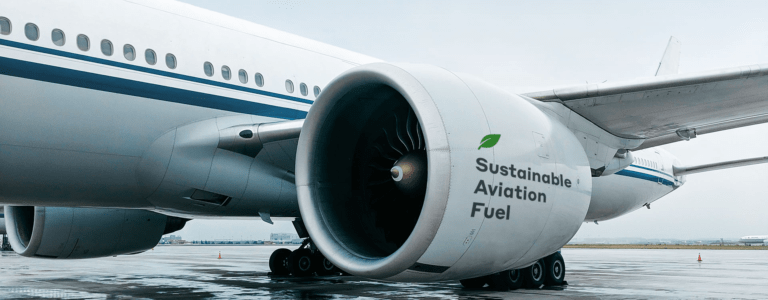
The sustainable aviation fuel market is projected to grow rapidly, with a robust compound annual growth rate (CAGR) of 60% expected during the forecast period. Revenue is forecasted to reach US$ 563.2 million in 2023, and it is anticipated to exceed USD 61.92 billion by 2033.
Sustainable Aviation Fuel (SAF) is gaining momentum for several compelling reasons. Firstly, environmentally conscious consumers are pressing for greener travel options; SAF addresses this demand by significantly cutting emissions, thus appealing to eco-aware travelers and helping airlines boost their green credentials. Additionally, as governments worldwide push for a transition to renewable energy sources, investing in SAF aligns with this global trend and benefits from an increasingly supportive regulatory framework.
In terms of operational advantages, SAF not only reduces emissions by up to 80% but also offers superior storage capabilities over traditional jet fuels, enhancing aircraft performance and overall industry efficiency. Furthermore, technological advancements are expanding SAF’s applicability across various petroleum-based fuel engines in aviation, broadening its market potential and encouraging wider adoption.
Request for a sample of this research report: https://www.futuremarketinsights.com/reports/sample/rep-gb-14269
Embrace Green Skies and Secure Your Share:
- Invest in Innovation: Partner with research institutions or develop your own cutting-edge SAF technologies to ensure your fuel meets future demands.
- Collaboration is Key: Partner with governments and aviation giants to accelerate the transition to sustainable aviation fuels.
- Transparency Matters: Clearly communicate the environmental benefits of SAF to airlines and consumers, building trust and fostering a greener future.
- Embrace Efficiency: Focus on optimizing production processes and supply chain management to make SAF a cost-competitive option.
Key Points
- The North American region is one of the crucial spaces for a sustainable aviation fuel market. As it has many airports with a high density of international and national flights. Lately, the Biden administration has advanced the prospects of sustainable fuels in American aviation with a target of reducing aviation emissions by 20% by 2030.
- Europe with its restored tourism industry and high tourist footfall has also invested in the sustainable aviation fuel industry. The European Parliament has passed a mandate named ‘ReFuelEU Aviation’ in 2022.
- Based on fuel type, the biofuel segment leads over other segments as it is considered highly safe, reliable, and low carbon. The fuel comes from forestry and agricultural waste.
- Based on biofuel blending capacity, the 30% to 50% segment leads as it is more acceptable across the regions.
Competitive Landscape
The key vendors work on fastening their manufacturing process while also expanding their plants. Furthermore, the mergers between the government and SAF producers are transforming the market strategies. Key competitors and also merge, acquire, and partner with other companies to increase their supply chain, and distribution channel.
Gain Immediate Access to Detailed Market Insights: https://www.futuremarketinsights.com/checkout/14269
Key Players:
- Preem (Sweden)
- OMV (Austria)
- Atmosfair (Germany),
- Wastefuel (United States)
- Prometheus Fuels
- Red Rocks Biofuel (United States)
- Northwest Advanced Biofuels
Recent Market Developments
- Swedish brand, Preem has selected Haldor Topsoe’s Hydroflex for its renewable fuel plant. The plant is expected to hold the potential of saving 2.5 million tons of Co2. The plant also holds a capacity of 16,000 barrels-per-day unit.
- German startup, Atmosfair has introduced the world’s first clean jet fuel plant with carbon-neutral aircraft technology.
Key Segmentations:
By Platform:
- Commercial Aviation
- Military Aviation
- Business & General Aviation
- Unmanned Aerial Vehicle
By Biofuel Blending Capacity:
- Below 30%
- 30% to 50%
- Above 50%
By Type:
- Total Stations
- Global Navigation Satellite Systems (GNSS)
- Laser Scanners
- Sensors
- Others
By Biofuel Manufacturing Technology:
- Hydroprocessed Fatty Acid Esters and Fatty Acids – Synthetic Paraffinic Kerosene (HEFA-
- Fischer Tropsch Synthetic Paraffinic Kerosene (FT-SPK)
- Synthetic Iso-paraffin from Fermented Hydroprocessed Sugar (HFS-SIP)
- Alcohol to Jet SPK (ATJ-SPK)
- Catalytic Hydrothermolysis Jet (CHJ)
By Fuel Type:
- Biofuel
- Hydrogen Fuel
- Power to Liquid Fuel
- Gas-to-Liquid
About Future Market Insights (FMI)
Future Market Insights, Inc. (ESOMAR certified, recipient of the Stevie Award, and a member of the Greater New York Chamber of Commerce) offers profound insights into the driving factors that are boosting demand in the market. FMI stands as the leading global provider of market intelligence, advisory services, consulting, and events for the Packaging, Food and Beverage, Consumer, Technology, Healthcare, Industrial, and Chemicals markets. With a vast team of ~400 analysts worldwide, FMI provides global, regional, and local expertise on diverse domains and industry trends across more than 110 countries.
Contact Us:
Future Market Insights Inc.
Christiana Corporate, 200 Continental Drive,
Suite 401, Newark, Delaware – 19713, USA
T: +1-845-579-5705
For Sales Enquiries: sales@futuremarketinsights.com
Website: https://www.futuremarketinsights.com
LinkedIn| Twitter| Blogs | YouTube